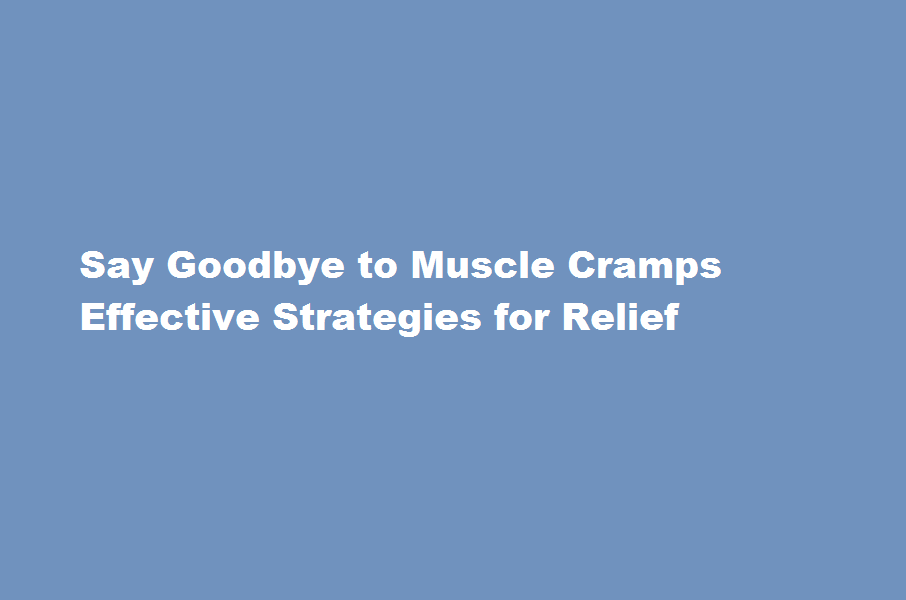Say Goodbye to Muscle Cramps Effective Strategies for Relief
4 min read
Introduction
Muscle cramps can be an unwelcome and painful experience, leaving individuals searching for ways to alleviate the discomfort. Whether caused by exercise, dehydration, or underlying medical conditions, muscle cramps can disrupt daily activities. Fortunately, several practical and effective strategies can help relieve and prevent these muscle spasms. In this article, we will explore valuable insights on how to get rid of muscle cramps, providing you with the necessary information to find relief and maintain optimal muscle health.
Understanding Muscle Cramps
Muscle cramps are sudden, involuntary contractions or spasms that occur in one or more muscles. They can cause intense pain and temporary immobilisation. The causes of muscle cramps vary but often include dehydration, electrolyte imbalances (such as low potassium, magnesium, or calcium levels), muscle fatigue, inadequate stretching, and certain medical conditions. Understanding the underlying cause is essential in addressing the issue effectively.
Relief Strategies for Muscle Cramps
- Stretch and Massage When a muscle cramp strikes, gentle stretching and massaging the affected area can provide immediate relief. Slowly and gently stretching the cramped muscle helps relax and lengthen it, while massage increases blood flow and relaxes the muscle fibres. Apply firm but gentle pressure to the cramping muscle using your hands or a foam roller. Remember to stretch and massage in a controlled manner, as aggressive actions may exacerbate the cramp or cause injury.
- Hydration and Electrolyte Balance Dehydration is a common trigger for muscle cramps, particularly during physical activity or hot weather. Maintaining adequate hydration levels is crucial to prevent cramps. Ensure you drink plenty of water throughout the day, especially before, during, and after exercise. Additionally, replenishing electrolytes, such as potassium, magnesium, and calcium, is essential. These minerals play a vital role in muscle function. Include electrolyte-rich foods in your diet or consider supplements to maintain proper balance and reduce the risk of cramps.
- Heat and Cold Therapy Heat and cold therapy can provide relief and relaxation to cramped muscles. Applying a warm compress or taking a warm bath helps increase blood flow, relaxes the muscle, and eases pain. Heat therapy is particularly beneficial for muscle cramps caused by muscle strain or tension. On the other hand, cold therapy, such as using an ice pack or cold towel, numbs the area and reduces inflammation. Cold therapy is ideal for acute injuries or cramps caused by intense physical activity.
- Regular Exercise and Conditioning Regular exercise and conditioning play a crucial role in preventing muscle cramps. Strengthening and stretching exercises, such as yoga, Pilates, or resistance training, help improve muscle flexibility and endurance. By gradually increasing exercise intensity and duration, you reduce the risk of muscle fatigue and cramps. However, it is essential to warm up properly before engaging in intense exercise and cool down afterward. Incorporating regular exercise into your routine not only helps prevent muscle cramps but also contributes to overall muscle health.
- Medications and Supplements In some cases, muscle cramps may require additional intervention, such as over-the-counter pain relievers or muscle relaxants. Consult with your healthcare provider or pharmacist to determine the most appropriate medication for your specific situation. Additionally, certain supplements like magnesium, calcium, and vitamin B complex have shown promise in reducing the frequency and severity of muscle cramps. However, always consult with a healthcare professional before starting any new supplement regimen to ensure safety and proper dosage.
FREQUENTLY ASKED QUESTIONS
What are 4 causes of muscle cramps?
Causes of muscle cramps include.
- Compression of your nerves, from problems such as a spinal cord injury or a pinched nerve in the neck or back.
- Dehydration.
- Low levels of electrolytes such as magnesium, potassium, or calcium.
- Straining or overusing the muscles.
What is the best medicine for muscle cramps?
Research has found that nonsteroidal anti-inflammatory drugs (NSAIDs), including ibuprofen and naproxen, are effective against pain due to muscle cramps, such as lower back spasms.
Conclusion
Muscle cramps can be debilitating, but with the right knowledge and strategies, relief is attainable. By implementing the techniques discussed in this article, including stretching, hydration, heat and cold therapy, regular exercise, and appropriate medication or supplements, you can effectively combat and prevent muscle cramps. Remember, if you experience frequent or severe muscle cramps that do not subside with self-care measures, it is crucial to consult a healthcare professional for further evaluation and guidance. Prioritise your muscle health and bid farewell to those pesky muscle cramps.
Read Also : Natural Ways to Alleviate Period Cramps A Guide to Finding Relief






